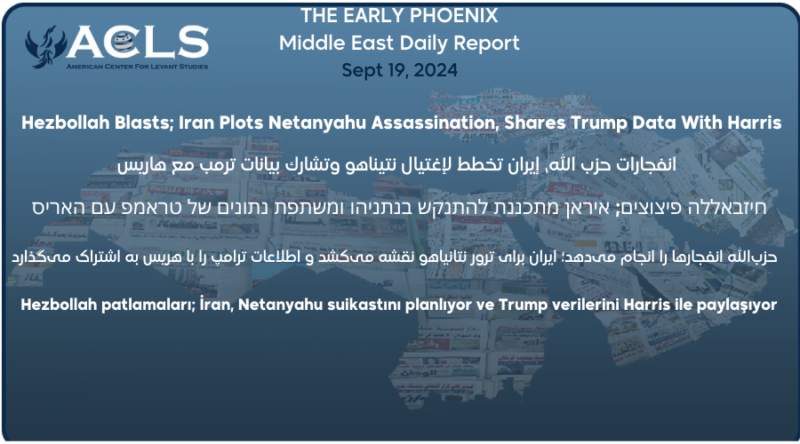
Sept 19, 2024
★ ISRAEL-HEZBOLLAH WAR
-
Hezbollah Targets IDF Position with Missile, Injuring 8
Hezbollah launched an anti-tank guided missile from Lebanon, striking an IDF position in northern Israel, this morning. The injured eight people, with two in moderate-to-serious condition and six lightly wounded. The injured were taken to Rambam Hospital in Haifa and Ziv Hospital in Safed. The missile hit the Ramim Ridge area, intensifying tensions along the border.
-
Hezbollah 2nd Wave of Explosions, 12 Killed, 450 Wounded
A second wave of explosions hit Lebanon on Wednesday, killing 12 people and wounding 450, following a deadly attack the previous day. The explosions targeted hand-held radios used by Hezbollah members, marking a severe blow to the group’s operations. The blasts also caused widespread destruction, burning shops, cars, and homes. Concerns have grown as walkie-talkies and military glasses went missing after the incident. Reports suggest that the batteries for these devices, charged two weeks ago, may have exploded. One explosion struck during a Hezbollah funeral for previous victims.
-
Taiwan Denies Exporting Pagers to Lebanon, Hungarian Company Involved
Taiwan denied exporting wireless communication devices to Lebanon, stating the devices were made by a Hungarian company. Taiwan’s Ministry of Economy confirmed over 49,000 devices were sent to the U.S. and Europe, unrelated to the explosions. Gold Apollo said the devices were produced by a Hungarian partner, suggesting modifications after export. Reuters reported that these wireless systems were linked to the earlier explosions. A Lebanese security source claimed Israeli intelligence planted explosives in 5,000 wireless devices imported by Hezbollah. Experts believe Hezbollah’s secure communication has been compromised, forcing the group to seek alternatives. The group relies on specialized suppliers for its devices, but the breach has damaged trust. Hezbollah’s communications are now vulnerable to Israeli cyber warfare, leaving no escape from Israel’s technological superiority.
-
Ongoing Military Actions Between Israel and Hezbollah
Israeli forces conducted airstrikes on Hezbollah positions in Kfarshouba, Kfarkala, and Hula in southern Lebanon, targeting key installations. Airstrikes also hit Al-Jabain and Shama near Tyre. In retaliation, Hezbollah launched Katyusha rockets at Israel’s Brigade 810 base in Habouchit and shelled the Easthill Battalion and Biyaad Bleda sites. Hezbollah’s rocket fire reached northern Israel, causing fires in Kiryat Shmona, while Israeli air defenses intercepted a Hezbollah drone over the Sea of Galilee. Ten rockets landed in open areas without casualties. Israeli ground units conducted maneuvers near the Lebanese border, heightening operational readiness. Hezbollah vowed to continue military operations, escalating tensions after recent attacks on their communication devices. Israel raised its alert level, preparing for further Hezbollah responses, while senior military officers reviewed defensive strategies.
=======
★ ISRAEL & PALESTINIAN TERRITORIES
-
Israeli Arrested for Iran-Backed Plot to Assassinate Netanyahu
An Israeli businessman was arrested for his involvement in an Iranian-backed plot to assassinate Prime Minister Benjamin Netanyahu, Defense Minister Yoav Galant, or Shin Bet head Ronen Bar. Israeli security services reported that the suspect was smuggled into Iran twice, where he met with Iranian intelligence officials and was tasked with planning assassination missions in Israel. The plot was linked to revenge for the July killing of Hamas leader Ismail Haniyeh in Tehran. The suspect, connected to Türkiye, demanded $1 million in advance but was denied. He was arrested last month and has since been indicted.
-
Israeli-Hamas Engagement in Rafah
Al-Qassam Brigades released footage showing the destruction of an Israeli Namer troop carrier and D9 bulldozer east of Rafah. Using a Yasin 105 anti-tank missile, they disabled the vehicles, preventing their removal for over 24 hours. Simultaneously, four Israeli soldiers were killed in Rafah during a booby-trapped building assault. The Israel Defense Forces continue to encounter significant resistance, with heavy booby traps hindering their ground operations. Israeli casualties have now reached 348 since the offensive began.
-
Israel Proposes Safe Exit Deal for Sinwar to End Conflict
Israel has offered a “Safe Exit Deal” to the U.S., proposing the release of all kidnapped soldiers in exchange for Hamas leader Yahya Sinwar’s safe exit from Gaza, along with others who wish to leave. The deal includes disarming the Gaza Strip, releasing Palestinian prisoners, and establishing a new management system for the region. The proposal aims to end the war quickly. Gal Hirsch, Israel’s coordinator for prisoners, shared the plan with the families of the kidnapped during meetings with U.S. officials. The plan is a secondary option to expedite negotiations.
-
UN Approves Palestinian Proposal Mandating Israeli Withdrawal from Territories
The UN General Assembly approved a Palestinian proposal requiring Israel to comply with International Court of Justice decisions. This includes ending Israel’s presence in the Occupied Palestinian Territory within six months, withdrawing the IDF, halting settlements, and facilitating the return of Palestinians. The proposal also urges nations not to recognize Israel’s presence there, enforce sanctions on senior Israeli officials, and halt weapon transfers if misuse is suspected.
=======
★ IRAN
-
Iranian Hackers Sent Stolen Trump Campaign Data to Harris Campaign, FBI Confirms
Iranian cyber actors targeted President Trump’s campaign by hacking and sending stolen information to individuals linked to the Harris campaign, according to a joint statement from the FBI, CISA, and the Office of the Director of National Intelligence. At a rally in New York, former President Donald Trump accused the Harris campaign of colluding with Iran in the spying activities.
-
Iran Accuses Israel of ‘Mass Murder’ in Hezbollah Pager Explosions
Iran condemned Israel for “mass murder” after pager explosions in Lebanon killed 12 Hezbollah operatives and injured thousands. Iranian Foreign Ministry spokesman Nasser Kanaani labeled the attack a “terrorist act” by Israel. Hezbollah blamed Israel and vowed retaliation but stated it is not seeking full-scale war. Tensions remain high following the incident.
===========
★ IRAQ
-
Iran Urges Iraqi Forces to Retaliate After Beirut Cyberattack
Iran’s Mojtaba Zarei urged Iraq’s Popular Mobilization Forces to strike Israel after a cyberattack on Iran’s ambassador in Beirut. The attack, attributed to Tel Aviv, disabled Hezbollah’s communication systems. Zarei likened the event to previous assaults on Iran’s consulate in Damascus, leading to Iranian casualties. He stressed defending Iran’s sovereignty against Israeli aggression. The Israel Defense Forces (IDF) reported that Israeli fighter jets intercepted a UAV launched from Iraq over the Sea of Galilee.
======
★ SYRIA
-
Assad’s Secret Nuclear Project Exposed
Israel accuses Syria of building a secret nuclear facility in Deir ez-Zor for plutonium production, allegedly with Iranian support. Moshe Edri, head of Israel’s Atomic Energy Commission, revealed the claim during an IAEA conference in Vienna. He asserted that Syria has violated nuclear safeguard agreements for over a decade, with Iran playing a key role in supporting Syria’s nuclear ambitions. Edri also warned of Iran’s continued military nuclear advancements, posing a threat to regional security by accumulating dangerous fissile material and nuclear technology.
========
★ YEMEN
-
Houthis Offer Support to Hezbollah After Beeper Explosion
The Houthi militia expressed solidarity with Hezbollah, offering to send fighters following the Beeper massacre, which killed 3,000. Houthi leader Abdullah Amer stated that Hezbollah has the right to retaliate, citing broad Arab and Islamic support.
-
Iran Declares Peace Condition in Yemen During UN Meeting
Iran’s Foreign Minister Seyed Abbas Araghchi outlined Iran’s condition for peace in Yemen during a meeting with UN envoy Hans Grundberg. He reiterated Iran’s support for peace but emphasized the continued use of the Houthi militia to further its regional objectives. Araghchi also linked Israeli actions in Gaza to regional instability and tensions.
-
Yemen Officially Launches Starlink, Houthi Threatens Retaliation
Yemen’s government launched the Starlink satellite internet service, the first in the Middle East. The Yemeni Telecommunications Corporation announced Starlink’s activation, promising high-speed internet for remote areas. In response, the Houthi group threatened to block the service, calling it a threat to sovereignty and national security. The Houthis, who control internet access in their regions, urged citizens to reject Starlink, citing privacy concerns and foreign influence.
=======
★ GULF NATIONS
-
Saudi Crown Prince: No Israel Ties Without Palestinian State
Saudi Crown Prince Mohammed bin Salman stated that Saudi Arabia will not establish relations with Israel unless an independent Palestinian state is created. In his speech to the Shura Council, he condemned Israeli actions against Palestinians and reaffirmed the Kingdom’s commitment to a Palestinian state with East Jerusalem as its capital. Diplomatic relations with Israel, he said, depend on achieving this goal.
========
★ EGYPT & AFRICA
-
Egypt Reiterates Firm Stance Rejecting Amendments to Philadelphi Agreement
Egypt’s Foreign Minister Badr Abdel Aaty firmly emphasized Egypt will reject any amendments to pre-October 7 Philadelphi agreements. Progress has been made in recent negotiations regarding the Gaza ceasefire during the last month and a half. Abdel Aaty also emphasized avoiding any steps or measures that could escalate tensions and potentially reignite the ongoing conflict.
-
Egypt Sees 11% Rise in Circulated Money, Reaches $41.22 Billion
The total money in circulation in Egypt reached approximately $41.22 billion by the end of May 2024, reflecting an 11% increase from December 2023’s figure of $37.09 billion. The Central Bank’s report shows that 200-pound notes represented about $26.12 billion, up from $23.75 billion in December 2023. The 100-pound notes rose to $12.56 billion from $11.19 billion, while 50-pound notes reached $1.60 billion, up from $1.34 billion during the same period.
-
Egypt Repays $8.2 Billion in External Debt Over Three Months
Egypt has repaid $8.255 billion in external debt, including interest and principal, from January to March 2024, according to the Central Bank’s statistical bulletin. The debt service was split into $2.542 billion in interest payments and $5.712 billion in principal repayments. This repayment underscores Egypt’s ongoing commitment to meet its financial obligations.
=======
★ TURKIYE
-
Türkiye Sentences 37 Defendants for Espionage Linked to Mossad
A Turkish court sentenced 37 individuals for espionage activities linked to Israel’s Mossad. The 28th High Criminal Court in Istanbul sentenced A.K.Ö. and A.E. to eight years and four months imprisonment, while 35 others received six years and eight months each. A.K.Ö., a retired police officer, was among the key figures in the espionage network, which included foreign nationals. Defendants were accused of transferring money, conducting surveillance, and gathering confidential information on Mossad’s targets within Türkiye.
-
Türkiye’s Short-Term Debt Reaches $176.1 Billion as of July
Türkiye’s short-term external debt reached $176.1 billion in July, with banks’ debt rising 12.7% to $77.1 billion. Other sectors saw a 1.7% decrease in short-term external debt, amounting to $60.3 billion. Foreign exchange loans taken by banks from abroad surged 42.9%, totaling $18 billion. Public sector short-term debt, including public banks, grew by 11.6% to $38.5 billion. Private sector short-term debt increased by 3.8%, reaching $99 billion. The debt composition includes 47.3% in US dollars, 21.5% in euros, 14.8% in Turkish lira, and 16.4% in other currencies.
=========
To find all previous editions, click here.
To subscribe to our community, click here.
To share your opinion and or comment, fill the form below.



